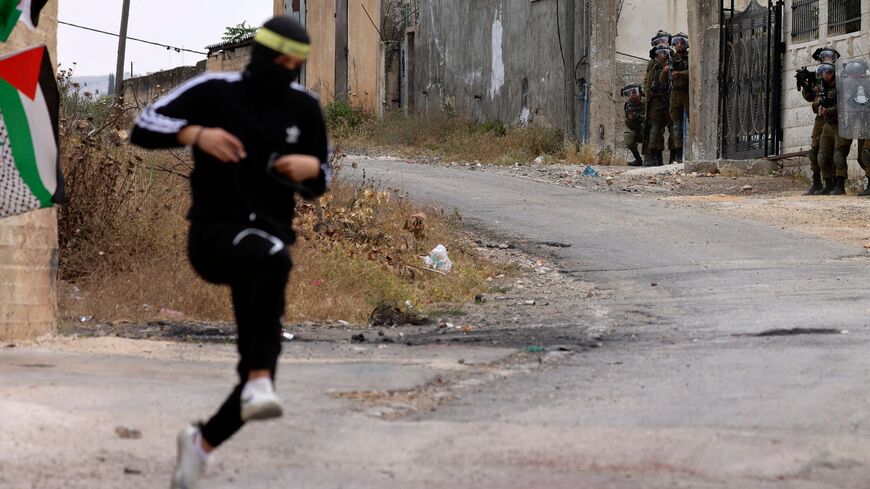Six Palestinian residents of the West Bank village of Burqa and one Jewish settler were injured in clashes that broke out Wednesday evening near the flashpoint Homesh outpost.
The Palestinian Red Crescent Society reported that one of the six Palestinians sustained a bullet injury in his leg. Israeli authorities said the Israeli man suffered a head wound from villagers throwing stones. Tel-Aviv-headquartered human rights organization Yesh Din said clashes erupted after European diplomats toured the area.
Homesh was one of the four north Samaria settlements evacuated in the framework of the 2005 Israeli disengagement from the Gaza Strip. Since then, Israeli law has prohibited Israelis from entering the area and from rebuilding the demolished settlements. Still, despite the legal prohibition, over the years Israelis have been settling at the four sites in attempts to establish a presence there. Attempts have increased since December 2021, when settler Yehuda Dimentman was killed by Palestinian assailants when leaving the makeshift yeshiva established in Homesh.
On March 20, as part of the coalition agreement between the Likud and the Religious Zionism party, the Knesset canceled part of the Gaza Disengagement Law of 2005, enabling Israelis to enter the evacuated sites, but not rebuild them. Last week, Israel Defense Forces (IDF) Central Commander Maj. Gen. Yehuda Fox signed a decree, removing the ban on the arrival of Israelis to Homesh that had been in place until then for security reasons. The move by Fox, under orders of Defense Minister Yoav Gallant, was widely condemned by the European Union and by the United States.
“This order is inconsistent with both former Prime Minister [Ariel] Sharon’s written commitment to the Bush administration in 2004 and the current Israeli government’s commitments to the Biden administration,” argued US State Department spokesperson Matthew Miller, adding that West Bank settlement expansion on land sought by the Palestinians for a future state is an obstacle to achieving a two-state solution.
Miller was referring to the Aqaba summit on Feb. 26 and the Sharm el-Sheikh summit on March 20, where according to the Biden administration, Israel committed to halting settlement expansion for four months and not to regulate illegal outposts for a period of six months.
The Israeli government told the Biden administration that it does not seek to rebuild Homesh, stressing the new IDF decree was signed only to allow moving the Homesh outpost from private land to state land, Axios reported Thursday.
The makeshift yeshiva in Homesh was built on private Palestinian lands. Palestinian residents of the area have petitioned the High Court to prevent settlers from using these lands. The government now intends to move the makeshift yeshiva from the private lands to a small plot nearby owned by the state, so as not to confront the High Court on the issue.
Reacting to the news on the intention to relocate the yeshiva, former US Ambassador to Israel Martin Indyk tweeted, “Hmm. So Netanyahu promises Biden not to build a new settlement in Homesh but instead will move the yeshiva to nearby 'state land' and call it Homesh! I hope US ambassador Tom Nides calls it for what it is — bs.”
The EU condemned on Wednesday the IDF decree; EU spokesperson Peter Stano said the block was "gravely concerned" by the decision.
"The EU urges the Israeli government to reverse its decisions taken on 17 May to advance plans for more than 600 housing units in existing and new settlements in the West Bank," said Stano in a statement.
These developments come on the backdrop of a Haaretz report on Finance Minister Bezalel Smotrich instructing government ministries to help prepare the infrastructure to double the number of West Bank settlers from 500,000 to 1 million. According to Axios, associates of Prime Minister Benjamin Netanyahu told Biden administration officials that Smotrich’s plan was not part of the government’s policy and that the state does not intend to implement it.
That being said, Israel’s state budget for 2023-24, adopted on Wednesday night, includes the investment of several billion shekels in West Bank settlements. Some 3.5 billion Israeli shekels ($940 million) will be invested in paving new roads and upgrading existing ones, including roads bypassing Palestinian urban centers.







